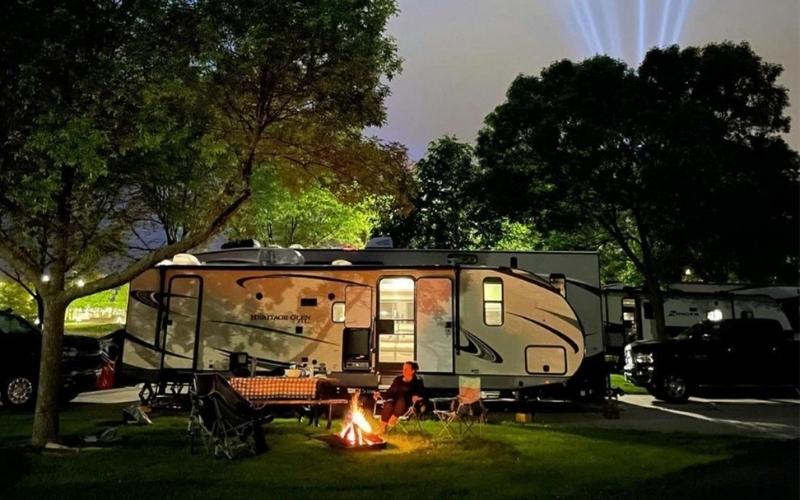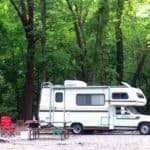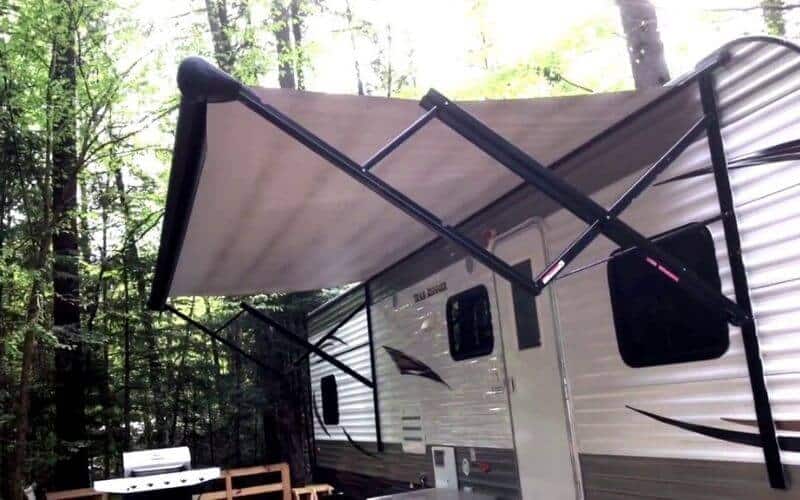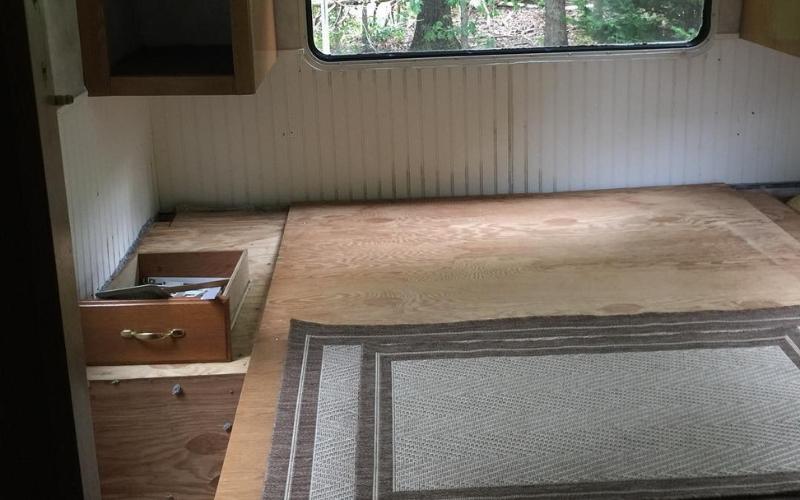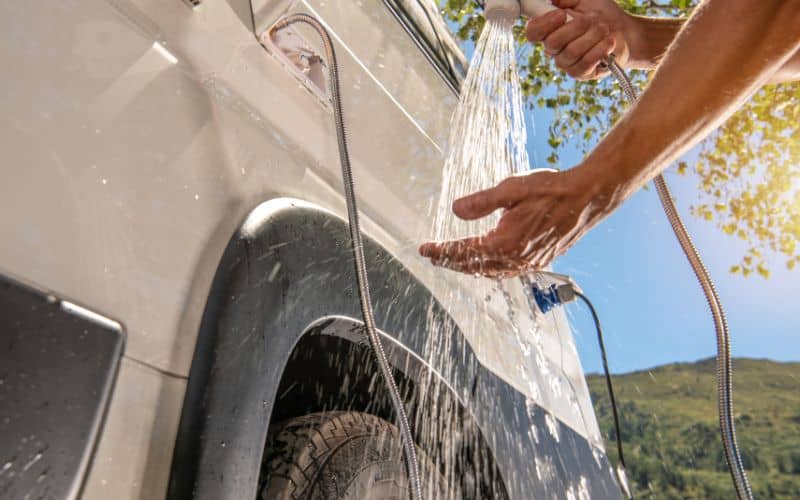One of the great things about traveling in an RV is the ability to park and camp anywhere it’s accessible and permissible.
Although there are definite benefits to staying at RV parks, there are also many other options available to travelers that offer unique perks of their own.
We’ve put together this guide to explain the different types of options available to RV travelers and to teach you the vital skill of finding free overnight RV parking near you.
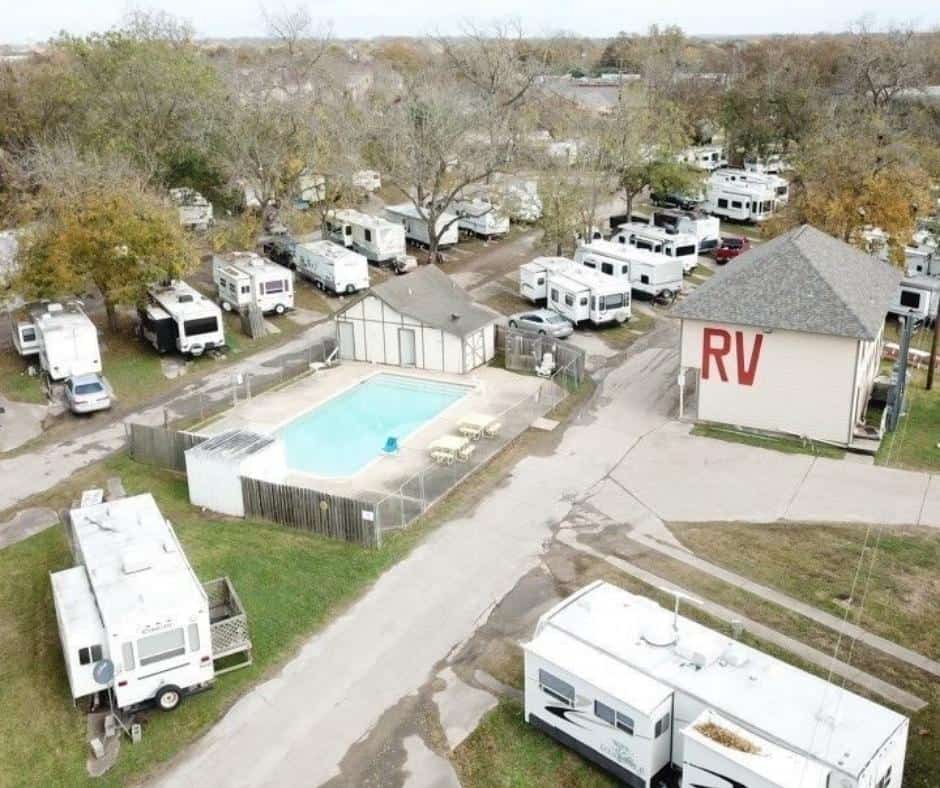
Why You Should Avoid RV Parks?
There’s no denying that there are some beautiful RV parks across the country, and for those who desire full hook-ups and who have money to spare, these may be the ideal option.
But staying at an RV park is much like staying at a hotel where you bring your own room and doesn’t take advantage of some of the benefits RV travel offers.
Not only can the flexibility of where you park save you a lot of money, but it can also lead you to some unique places to wake up in.
Not for the Budget Traveler
RV parks have the potential to be quite costly due to the amenities they offer. All RV parks have water and electric hook ups as well as waste disposal areas, while some also offer various recreational facilities.
Staffing these parks and upkeeping the amenities come at a cost, and a nightly fee helps to cover these expenses.
RV parks average anywhere from $15-50 per night, with the country-wide average at $29.12 per night.
While this may not seem like much compared to the cost of a hotel room, it quickly adds up to $900+ per month, the equivalent of rent in many places.
Considering that this cost is before additional expenses like gas and food, your vacation quickly goes from being thrifty to being a splurge.
If you choose to go this route despite the cost, or even if you just stay at RV parks to use their facilities during a portion of your travels, some popular membership clubs can help to reduce the price.
The most popular clubs in the US include:
- Escapees RV Club
- Good Sam
- KOA
- Passport America
Memberships generally cost under $50 a year, with each offering unique benefits on all aspects of RV travel.
Popular and Bustling
RV parks are some of the most popular places to park overnight and can be quite busy for that reason.
Although they offer a great way to meet other travelers, they may not be the right choice for those in search of some peace and quiet.
RV parks are often located next to popular destinations and tend to fill up quickly in warmer months.
You will inevitably have neighbors, and you may not be able to get a spot without booking it months ahead of time.
Choosing to park somewhere other than an RV park can not only save you money, but it can provide you greater flexibility in when and where you travel.
Many RVers enjoy the spontaneity and solitude that RV travel allows, and other camping options can facilitate these experiences better than RV parks can.
Places You Can Park Your RV Overnight For Free
Let’s take a look at the many free places that you can park your RV overnight.
2. Campgrounds
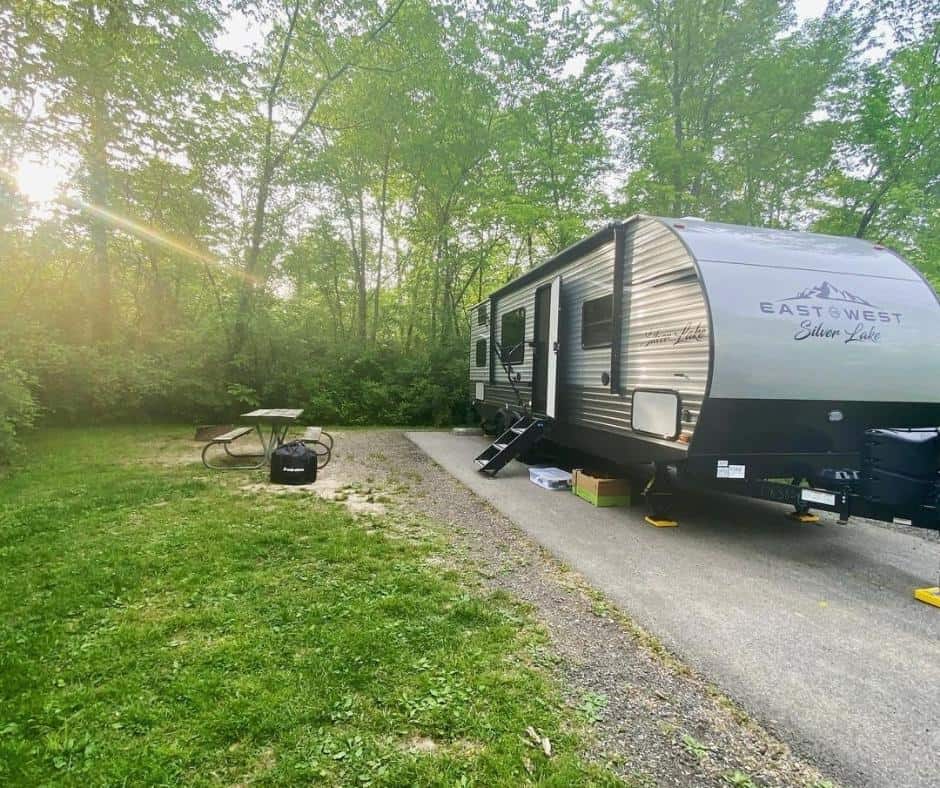
Campgrounds can be found all throughout public lands and are either free or low-cost, depending on the type of land you are on.
While camping in National Parks and State Parks often require you to purchase passes or permits, other types of public lands offer free camping in many areas.
BLM Lands
Camping on Bureau of Land Management (BLM) lands is affordable and easy to come by on the west coast.
There are 245 million acres of BLM managed lands dispersed across the following states:
- Alaska
- Arizona
- California
- Colorado
- Idaho
- Montana
- Nevada
- New Mexico
- Oregon
- Utah
- Wyoming
The Bureau of Land Management is responsible for managing the various uses of these lands, with uses including
- Conservation of land and resources, with 27 million acres and the resources they carry being protected and restored under the National Landscape Conservation System
- Recreation such as hiking and camping
- Energy development, including protecting land from drilling as well as promoting renewable energy
- Fishing
BLM lands offer different types of camping opportunities. Backcountry camping spots on which to boondock can be found scattered throughout them, as well as campgrounds complete with hookups.
While backcountry spots are always free on BLM lands, staying on a campground may cost a small fee that helps maintain the facilities.
Camping on BLM lands is permitted for up to two weeks per month.
United States Forest Service (USFS) Lands
Forest Service lands include National Forests, Grasslands, and Recreation Areas.
They offer dispersed camping, throughout their 193 million acres, with a majority of the spots allowing camping free of charge.
Forest Service lands are a great way to find solitude in interesting natural settings, and most allow you to camp in the same spot for at least two weeks per month.
3. Rest stops
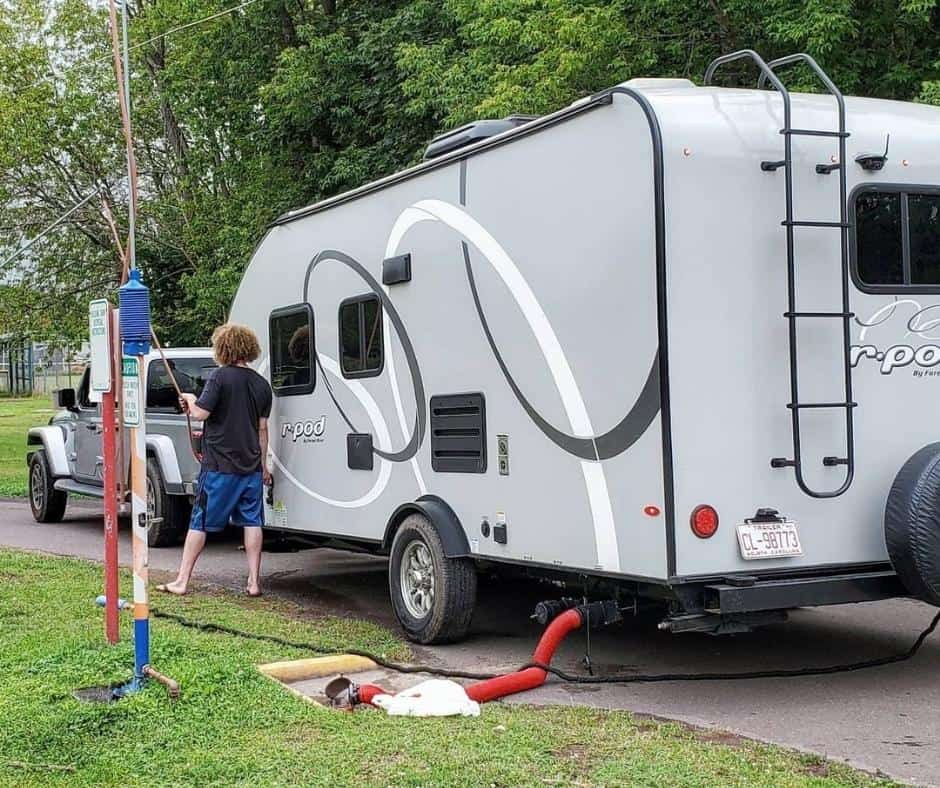
Rest stops are a great place to catch some shut eye. They usually have more than enough room for cars and campers, and they come with bathroom facilities that are always open.
Many rest stops also offer the following amenities:
- Drinking fountains
- Dump stations
- Electric hook-ups
- Garbage and recycling
- Pet exercise areas
- Picnic areas
- Vending machines
- Wi-fi
Be sure to look for signage indicating any limit to how long you can park at rest stations as each state has its own rules.
If you’re in doubt, you can also always call a local DOT office for more information.
4. Parking Lots
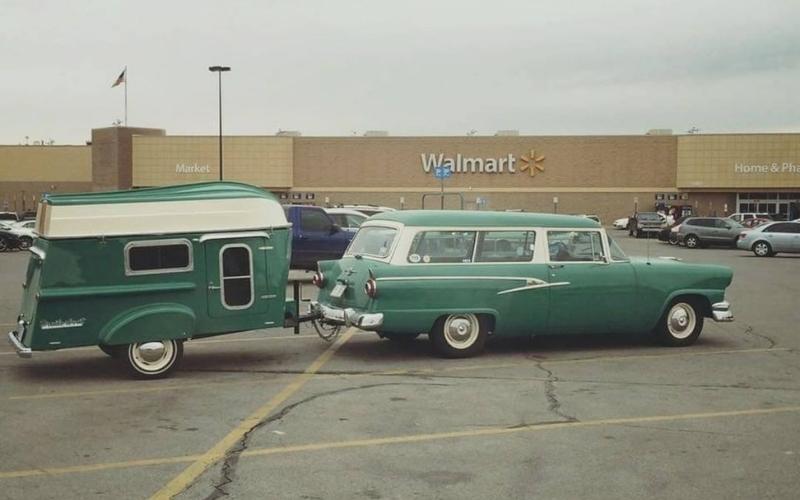
For those who are looking for a place to catch some shut eye before moving on, parking lots can be a fantastic free option.
There are a number of stores that are easy to come by all around the country and that allow overnight parking at no charge.
Parking lots are usually safe and convenient places to park, but should never be used for more than one night.
Walmart is perhaps the most well-known store to allow overnight parking, but it didn’t get this reputation just because their parking lots are large and stores are often open 24 hrs. a day.
Actually, Sam Walton, founder of Walmart, specifically wanted to welcome RVers who he understood to be great customers.
To this day, many Walmart stores welcome RVs and any other vehicles to park overnight, although some have had to restrict this due to problems like vandalism, trash, and crime from those taking advantage of the overnight privileges.
Pay attention to posted signs stating that overnight camping isn’t allowed.
Another easy way to make sure you’re allowed to park overnight is to simply ask somebody in charge.
You can call the store or walk in and ask a manager if overnight camping is allowed. You can also check the local city ordinance to review their policy on overnight parking.
Other stores that allow free overnight RV parking include:
- Cabela’s
- Camping World
- Cracker Barrel
- Costco
- Sam’s Club
Always be aware of your surroundings and use common sense when parking at any of these stores overnight.
Look for signs that forbid overnight parking or that direct RVs to a specific area in the parking lot.
Overnight Parking Lot Etiquette
When parking overnight in a parking lot, there are certain codes of conduct to follow.
Although these are not necessarily hard and fast rules, following these simple protocols helps to:
- Keep you and your possessions safe
- Respect others around you
- Ensure that we continue being allowed to park overnight in these lots
Most of these are based on common sense and common curtesy, but could easily be an oversight by those new to parking lot etiquette.
Let’s take a look at some simple steps to take when staying in a parking lot overnight.
Draw Your Shades
Closing all shades and curtains on your RV is highly recommended both for your safety as well as a curtesy to others.
You never know who will come through the parking lot while you are there, and discretion can deter possible break-ins or attacks.
While most of these parking lots tend to be safe places to stay, exposing yourself and your possessions is an unnecessary risk that could come with some serious repercussions.
Lock your Doors and Avoid Leaving Your RV in the Middle of the Night
Just like drawing your shades, securing your RV is a simple safety precaution.
Especially Walmart parking lots get all sorts of visitors at any time of the day or night, but taking a few simple measures to secure your safety can help you sleep soundly.
Only Take Up as Much Room as You Need
Parking lots vary by size and popularity, and we want to make sure that there is room for any weary traveler in search of a place to rest their eyes.
Although it’s understandable that RVs will require more than one standard parking space, try not to take up more space than your vehicle requires.
Always park either in designated RV parking, or in the back of the parking lot, out of the way of store customers.
Keep it Down
Parking lots aren’t camp sites, and those staying in parking lots overnight are there to sleep.
Making excessive noise can get you some very unhappy neighbors and perhaps even a visit from any onsite security.
While you are naturally free to work or do other quiet indoor tasks, be sure to keep the noise and light pollution to a minimum.
Leave No Trace
The Leave No Trace principle should apply to all outdoor activities, but we thought we’d mention it here because it may not seem as obvious in a parking lot versus a nature setting.
Although it’s not uncommon to find trash around parking lots, overnight parking privileges have also been reversed in parking lots were loitering and littering became problems.
To ensure continued use of these parking lots, and just to be courteous to other visitors and the planet we live on, always be sure to leave anywhere you visit or stay at in better condition than it was when you arrived.
5. Moochdocking
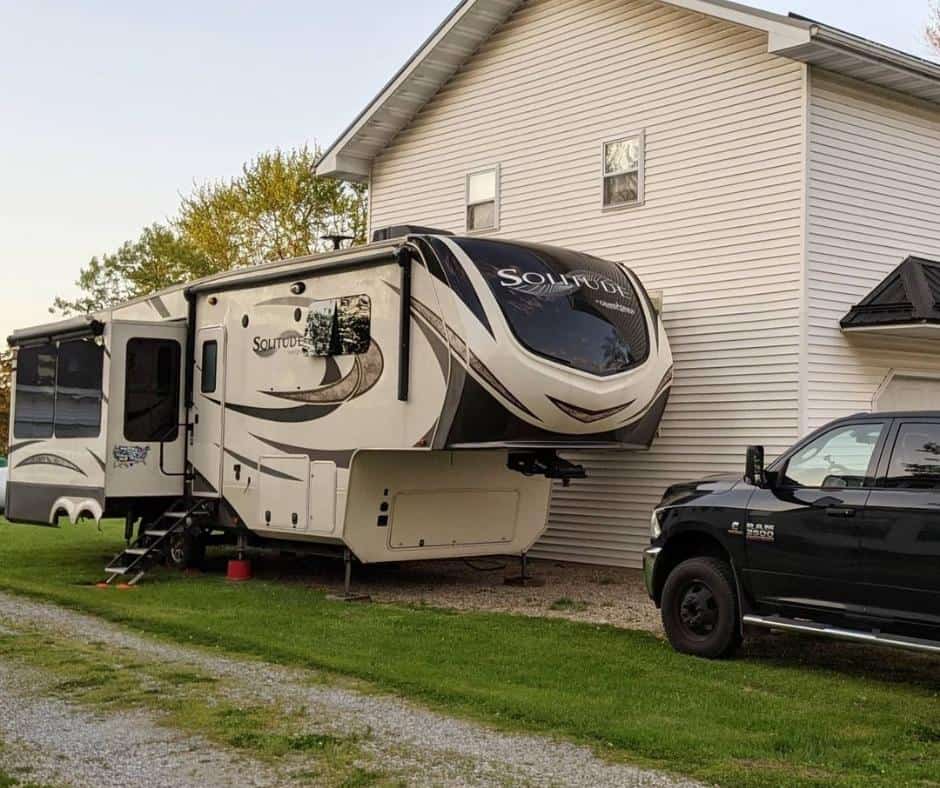
The fun term moochdocking comes from combining the words “boondocking” and “mooching”, and is used to describe parking on family or friends’ property and “mooching” off of their hook-ups.
Although the term mooching may be seen to have negative connotations, this can actually be a great way to see people along your travels.
Those close to you probably won’t mind lending you some power and water in exchange of a visit, and it can be a great way to save some money while still having access to all of your amenities.
If you feel guilty and don’t want to actually mooch without paying it back, we suggest lending a hand with any tasks they need done or inquiring as to how else you can be of use during your stay.
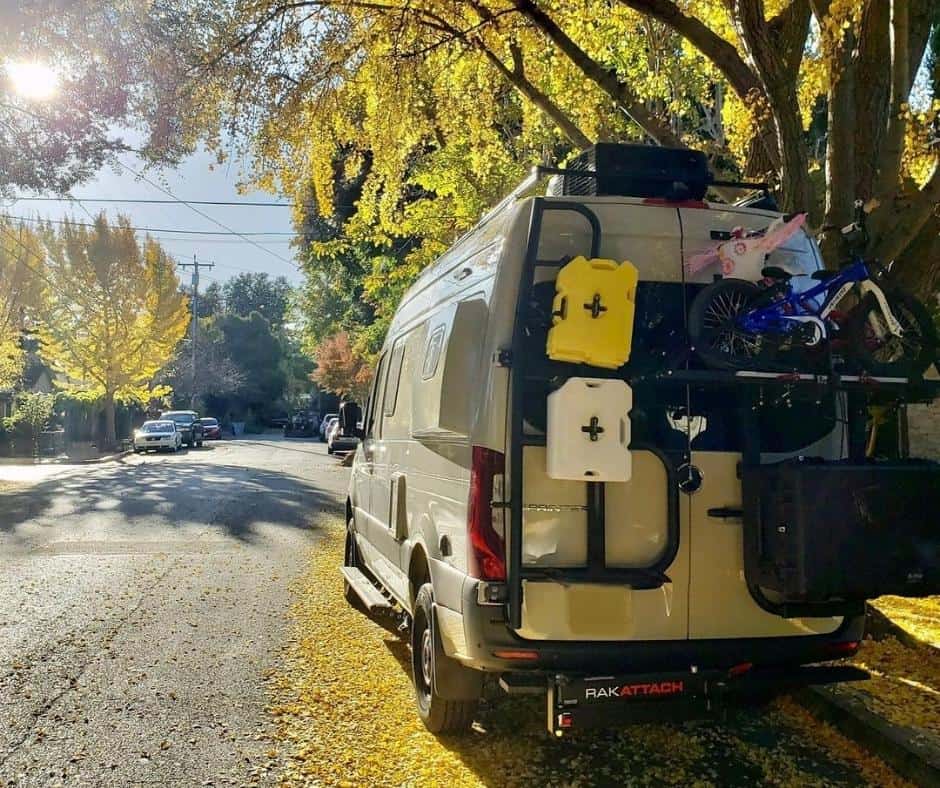
6. Stealth Camping
When you’re in a city or other Urban environment, it can sometimes be difficult to get out to a natural setting that allows overnight parking.
In this case, it may become necessary to stealth camp, a skilled form of camping in which you inconspicuously find street parking in a neighborhood to call home for the night.
These are not legal camp spots and run the risk of unhappy neighbors, but are an easy way to rest for a short stay at no cost.
A few tips from van-lifers experienced in stealth camping include:
Tools to Help You Find Free Parking
There are a lot of resources available to assist you in finding free parking and camping spots.
Those that are paid memberships are relatively low-cost and can provide you with some interesting places to stay, while the websites and apps listed here are all free, or have free and paid versions to choose from.
Lets take a look at some of the most popular tools out there and what kinds of spots each can help you find to park your RV.
1. Allstays
This app offers several different apps to help you find everything you could possibly need on your travels, from hotels and truck stops to overnight parking lots and campgrounds.
Their RV and Camping app has a collection of over 37,000 campgrounds along with their amenities and any restrictions or available discounts.
2. RVParky
It is made by RVers, for RVers, and claims to provide the largest database of RV parks and campgrounds across the United States and Canada.
The free app provides complete information about each campground, including nightly prices (if applicable), amenities, photos, and reviews.
3. Campendium
This is a more comprehensive website and app that lists over 20,000 campgrounds and boondocking spots, as well as other resources such as camping and gear guides.
The app features comprehensive search options that let you filter your results by location, type of campgrounds, price, and facilities.
Campendium is free to use, but also offers a membership version for $20/year.
With this upgrade, you’ll get an ad-free experience, and you’ll be able to search for spots based on cell service and elevation.
You will also be able to search for nearby trails and see any saved favorites in your search.
4. Freecampsites.net
It’s a platform on which campers can share campsites they find with others, because community is all about helping each other out.
It has a great interactive map that lets you find campsites near you, and it even offers a trip planner tool.
5. The Vanlife app
One of the newest resources on this list and it’s a great source to engage in the road travel community.
This app not only helps you to find places to park and camp near you, it is intended to be a one stop shop where you can find any resources, events, and information you may need.
Engage and learn from other experienced road travelers, find community events, and find links to resources for any other questions you may come across.
6. Harvest Host
It’s a paid membership program that gives you access to over 1782 free camping spots at unique locations including wineries, breweries, and farms.
A membership costs $99/year (or $139/year for the upgraded version that also offers golf clubs and country clubs as well as access to their spas and restaurants).
However, this is a one-time fee, and all listed locations are free to stay at thereafter.
Harvest Host intends each visitor to stay for no more than 24 hours, though they do say that it is at the host’s discretion if they choose to let you stay longer.
You must be traveling in a self- contained camper, and they also suggest making a purchase at each location as a way of paying back for your stay.
This means that the camp site may not be completely free, but you’ll be walking away with some fantastic food and beverages, and we think that’s a pretty great trade.
7. Boondockers Welcome
Similar to Harvest Host in that it connects you with people willing to invite you to stay on their property for free, but they focus more on urban settings.
Instead of wineries and farms, Boondockers Welcome connects you with over 2,800 hosts willing to let you stay a night on their personal properties.
Boondockers Welcome says that no purchase or gift is necessary, but that the best way to pay a host back is with a great review.
They also offer credits to anyone who can also host themselves, keeping the community close knit and transparent.
8. HipCamp
This resource made to help you find an assortment of camping spots, both for RVs as well as those camping in a tent or those looking for unique stays such as in treehouses.
This resource is community based with up-to-date reviews, ratings, and information. If you’re looking for a unique campground on private lands.
HipCamp is a free resource, though the campgrounds themselves vary in price.
Ready to Hit the Road
Now that you have an assortment of tips and resources to help you find free overnight RV parking, you’re ready to hit the road and begin your adventure.
Whether you choose a winery, a campground, or a Walmart parking lot, always remember to be aware of your surroundings, to practice the Leave No Trace principles, and most importantly, to enjoy the journey.

